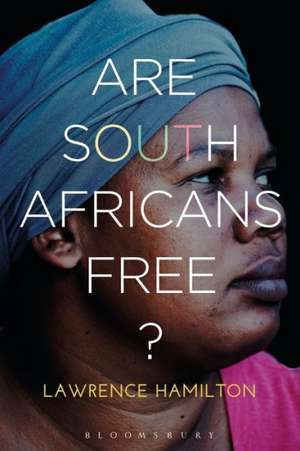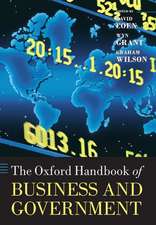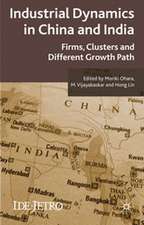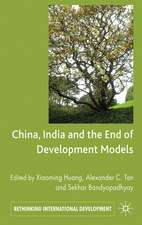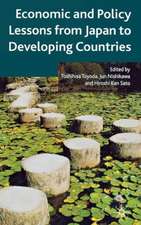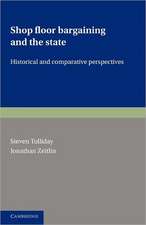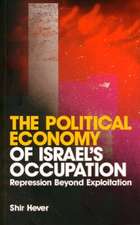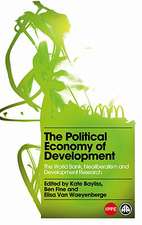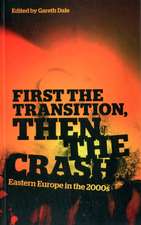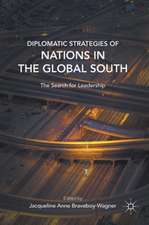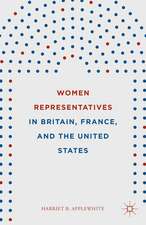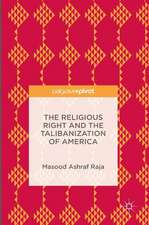Are South Africans Free?
Autor Lawrence Hamiltonen Limba Engleză Paperback – 9 apr 2014
| Toate formatele și edițiile | Preț | Express |
|---|---|---|
| Paperback (1) | 177.77 lei 43-57 zile | |
| Bloomsbury Publishing – 9 apr 2014 | 177.77 lei 43-57 zile | |
| Hardback (1) | 539.18 lei 43-57 zile | |
| Bloomsbury Publishing – 9 apr 2014 | 539.18 lei 43-57 zile |
Preț: 177.77 lei
Nou
Puncte Express: 267
Preț estimativ în valută:
34.03€ • 36.97$ • 28.60£
34.03€ • 36.97$ • 28.60£
Carte tipărită la comandă
Livrare economică 21 aprilie-05 mai
Preluare comenzi: 021 569.72.76
Specificații
ISBN-13: 9781472534613
ISBN-10: 1472534611
Pagini: 168
Dimensiuni: 156 x 234 x 15 mm
Greutate: 0.3 kg
Editura: Bloomsbury Publishing
Colecția Bloomsbury Academic
Locul publicării:London, United Kingdom
ISBN-10: 1472534611
Pagini: 168
Dimensiuni: 156 x 234 x 15 mm
Greutate: 0.3 kg
Editura: Bloomsbury Publishing
Colecția Bloomsbury Academic
Locul publicării:London, United Kingdom
Caracteristici
Author is an internationally known political theorist who has taught in South Africa for 10 years
Notă biografică
Lawrence Hamilton is Professor of Political Studies, University of the Witwatersrand, South Africa, and Affiliated Lecturer in Political Theory, Department of Politics and International Studies (POLIS), Cambridge University, UK. He is also an Elected Member of the Academy of Science of South Africa (ASSAf).
Cuprins
IntroductionChapter 1: Political Freedom?Chapter 2: Poverty, Inequality and EducationChapter 3: Political Representation or What's Wrong with South Africa's Electoral System?Chapter 4: Public Debt and the Economic Credibility of the Post-Apartheid StateChapter 5: What is to be Done? Overcoming South Africa's Lack of FreedomConclusionBibliographyIndex
Recenzii
[Hamilton] is very good at defining the historical issues that have created a country ... His description of how the ANC has lead South Africa into what statistically seems to be a worse off position than the country they inherited is rigorous and largely without fault ... [an] excellent evaluation of the current state of South Africa.
The form and depth of [the author's] explorations ... makes the book worth reading for those who engage more closely with South African realities today.
Hamilton argues that post-apartheid freedom implies more than liberation from political oppression: it requires effective power. He argues his case with analytical acuity, imagination, and rare precision.
Pulls no punches and, in near to scornful language, tears apart the constitution and post-1996 politics as beholden to a human rights discourse of which the greatest danger is that it creates the false belief that individuals have the power to change their lot ... His axiom that freedom only comes from power to assess one 's own situation correctly and then control the agents one uses to go against society's norms to change that situation provides useful and easily comprehensible tools for analysis ... thank heavens for a scientist who shies from the almost ritualistic contortions some observers adopt to reduce every issue to the constructs of apartheid.
Are South Africans Free? interweaves the political concepts of freedom and representation with empirical evidence to construct a powerful analysis of the deep-seated problems facing South Africa as a young democracy. It demonstrates the value of political theory for understanding the threats posed to democracy by the absence of genuine freedom, at the same time as it challenges political theorists to look beyond the often idealised world of human rights discourse to the concrete material, social and political conditions of South Africa. The book also provides some novel suggestions regarding how the challenges facing this nation can be met, enabling South Africans at last to achieve true liberation from the domination, poverty and violence that are the legacy of a brutal colonial past.
In Are South Africans Free? Lawrence Hamilton advances a bold vision of a free South Africa based on more than a liberal constitution and individual rights, and yet also wary of the oppressive hegemony of 'people's power'. It is a vision of freedom through power; that is freedom through a state democratically revived by new institutions of representation. These institutions recognise the inevitable gap between rulers and ruled, but look to make this gap a space of accountability such that citizens can genuinely influence social and economy policy. Hamilton's vision is a street-wise, twenty-first century republicanism: tempering the reality that freedom is indivisible and that political community must be defended, with the recognition that people are different and that power must be constrained.
With great urgency and acuity, Hamilton brings illustrates the need to reconfigure the power relations which arrange our particular social order ... What makes his study persuasive is his figuring of social pathology in terms of freedom.
The form and depth of [the author's] explorations ... makes the book worth reading for those who engage more closely with South African realities today.
Hamilton argues that post-apartheid freedom implies more than liberation from political oppression: it requires effective power. He argues his case with analytical acuity, imagination, and rare precision.
Pulls no punches and, in near to scornful language, tears apart the constitution and post-1996 politics as beholden to a human rights discourse of which the greatest danger is that it creates the false belief that individuals have the power to change their lot ... His axiom that freedom only comes from power to assess one 's own situation correctly and then control the agents one uses to go against society's norms to change that situation provides useful and easily comprehensible tools for analysis ... thank heavens for a scientist who shies from the almost ritualistic contortions some observers adopt to reduce every issue to the constructs of apartheid.
Are South Africans Free? interweaves the political concepts of freedom and representation with empirical evidence to construct a powerful analysis of the deep-seated problems facing South Africa as a young democracy. It demonstrates the value of political theory for understanding the threats posed to democracy by the absence of genuine freedom, at the same time as it challenges political theorists to look beyond the often idealised world of human rights discourse to the concrete material, social and political conditions of South Africa. The book also provides some novel suggestions regarding how the challenges facing this nation can be met, enabling South Africans at last to achieve true liberation from the domination, poverty and violence that are the legacy of a brutal colonial past.
In Are South Africans Free? Lawrence Hamilton advances a bold vision of a free South Africa based on more than a liberal constitution and individual rights, and yet also wary of the oppressive hegemony of 'people's power'. It is a vision of freedom through power; that is freedom through a state democratically revived by new institutions of representation. These institutions recognise the inevitable gap between rulers and ruled, but look to make this gap a space of accountability such that citizens can genuinely influence social and economy policy. Hamilton's vision is a street-wise, twenty-first century republicanism: tempering the reality that freedom is indivisible and that political community must be defended, with the recognition that people are different and that power must be constrained.
With great urgency and acuity, Hamilton brings illustrates the need to reconfigure the power relations which arrange our particular social order ... What makes his study persuasive is his figuring of social pathology in terms of freedom.
